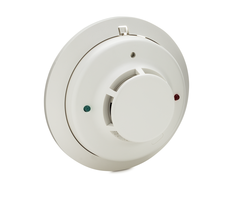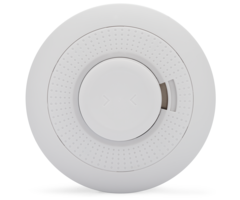Heat Detectors






Heat detectors work by sensing the temperature in the area. If the sensor detects an unusually high temperature that would only normally occur with a fire, then the sensor will activate. This exact temperature varies between different heat detector models. Some heat sensors also feature rate-of-rise temperature detection. This means that if the temperature rises at an unusually high rate, then the sensor will activate. Once a heat detector activates, it will send an alert to the panel. This will trigger a system fire alarm. The system will then alert the central station and/or the end user depending upon their monitoring plan.
A user can choose between hardwired and wireless heat sensors. If a user has a hardwired system, they will usually go with hardwired heat detectors. Likewise, if they have a wireless system, then wireless heat detectors are usually the easier option. In general, wireless heat sensors are much easier to install. This is because no wires need to be run. However, the end user will need to replace the batteries for their wireless heat sensors every few years. Some users do this more often, as these are very important sensors.
The decision to go with heat detectors over smoke detectors depends on where the devices are being installed. In most cases, smoke detectors will respond more quickly to a fire. But that doesn't necessarily that smoke detectors are the proper solution every time. There are cases where it is better to use heat sensors. This is mostly in areas where a smoke detector may cause false alarms. Heavy dust or moisture may cause false alarms for a smoke detector. This doesn't mean that anything is wrong with the smoke detector. It's just a result of the way that these devices function. In these areas, you may be better off going with heat detectors instead.
Garages and attics are both good locations for heat detectors. These areas often contain heavy dust. The dust can enter a smoke detector and prevent the device from working properly. This may even cause false alarms. You do not have to worry about this with heat detectors. Likewise, you may use heat detectors in bathrooms. These areas often have heavy moisture that may cause a smoke detector to activate. Another good spot for a heat detector is a kitchen. Cooking food and the resulting smoke may set off a smoke detector. Finally, heat detectors are frequently used in designated smoking rooms.
By using a heat detector and a system with central station monitoring, you can receive automatic emergency dispatch in the event of a fire. If you don't already have alarm monitoring service, we recommend clicking the orange alarm monitoring button at the top of this page for more information. We offer monitoring plans for all types of situations.






